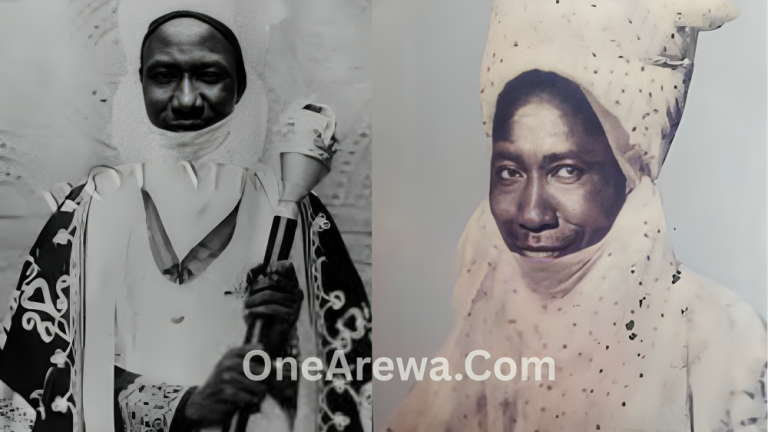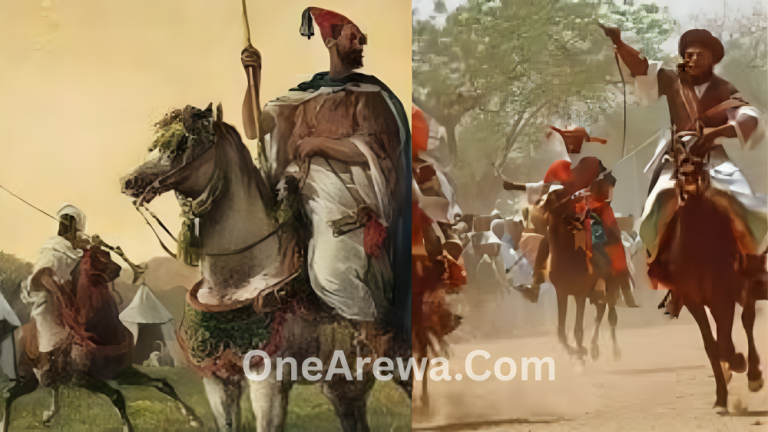Shehu Muhammad al-Amîn al-Kanemi (1776 – 8 June 1837)
Shehu Muhammad al-Amîn al-Kanemi (1776 – 8 June 1837)
Shehu Muhammad al-Amîn al-Kanemi (born 1776, died June 8, 1837) was a renowned Kanembu Islamic scholar, teacher, political and military leader who played a crucial role in reviving the Bornu Empire during the 19th century.
Born in Murzuk (present-day Libya) to a religious family, he traveled across North Africa and the Middle East in the 1790s, performing Hajj and studying Islamic sciences in Mecca and Medina.
Settling in Ngala in the early 1800s, he rose to prominence as a scholar. In response to the 1808 Sokoto jihad that led to the fall of Bornu’s capital, he organized a strong military and intellectual resistance, recapturing territories and engaging in influential theological debates with Usman dan Fodio and Muhammad Bello throughout the 1810s–1820s.
By the 1830s, al-Kanemi had become the de facto ruler of Bornu while still recognizing the Sayfawa dynasty.
Upon his death in 1837, his son Umar al-Kanemi succeeded him in 1846, formally founding the Kanemi dynasty and ending over 800 years of Sayfawa rule.

Shehu Muhammad al-Amîn al-Kanemi Profile
-
Born: 1776, Murzuk (now in Libya)
-
Died: 8 June 1837, Kukawa, Borno (now Nigeria)
-
Title: Shehu of Bornu
-
Reign: 1809 – 1837
-
Role: Religious scholar, military leader, and political ruler
-
Known For: Leading resistance against the Sokoto jihadists and founding the Kanemi dynasty
-
Predecessor: Position established (founder)
-
Successor: Umar I ibn Muhammad al-Amin (his son)
-
Children: Umar I, Abd ar-Rahman, Salih, Abubakar
-
Resting Place: Kukawa, Borno State, Nigeria
-
Nickname: Shehu Laminu
- Legacy: Strengthened Bornu politically and religiously; started a ruling dynasty that lasted for generations.
Check Out: Shehu Usman Dan Fodio: The Islamic Scholar Who Founded the Sokoto Caliphate (1754–1817)
Early Life and Education (1776 – 1800s)
Shehu Muhammad al-Amîn al-Kanemi was born in 1776 in Murzuk, located in present-day southwestern Libya, into a devout Muslim family of Kanembu and Arab descent.
From a young age, he showed exceptional dedication to Islamic learning.
In the 1790s, he embarked on extensive travels across North Africa and the Middle East, including Fezzan, Tripoli, and eventually to the Hijaz (present-day Saudi Arabia), where he performed the Hajj pilgrimage and deepened his studies in Mecca and Medina.
During this period, he gained recognition for his scholarship in Islamic jurisprudence, theology, and Sufism, becoming a respected teacher and preacher before returning to West Africa in the early 1800s, eventually settling in Ngala, near Lake Chad.
Return to Kanem-Bornu and Rise as a Religious Leader (Early 1800s – 1810s)
After completing his Islamic studies and travels, Shehu al-Kanemi returned to West Africa in the early 1800s, settling in Ngala near Lake Chad.
There, he established himself as a renowned Islamic scholar, preacher, and Sufi teacher, attracting followers and building a strong reputation for his knowledge, piety, and oratory skills.
His rise coincided with a time of political instability in the Kanem-Bornu Empire, especially due to the Fulani Jihad led by Usman dan Fodio, which threatened the region.
By the 1810s, al-Kanemi emerged as a key religious and intellectual figure, defending the Islamic legitimacy of Bornu’s leadership and challenging the ideological basis of the Fulani expansion, thus gaining the support of the Bornu ruling elite and positioning himself as a spiritual and political force in the empire.

Sokoto Jihad and Defense of Bornu (Early 1800s – 1820s)
During the early 19th century, the Sokoto Jihad led by Usman dan Fodio posed a major threat to the Kanem-Bornu Empire, as Fulani forces began advancing into Bornu territory.
In response, Shehu al-Kanemi emerged as a powerful defender of Bornu, using both his intellectual authority and military strategies to resist the Fulani expansion.
He publicly challenged Usman dan Fodio’s religious justification for the jihad, arguing that Bornu was already an Islamic state and that waging war against it was unjustified.
Through letters and debates, al-Kanemi became a formidable ideological opponent of the Sokoto Caliphate, and with the support of Bornu’s rulers, especially Mai Dunama IX Lefiami, he mobilized troops, fortified cities, and repelled several Fulani incursions.
His leadership during this period not only preserved Bornu’s independence but also elevated his status as a religious and political leader in the region.
Political Influence and Power (1820s – 1837)
By the 1820s, Shehu al-Kanemi had become the de facto ruler of Bornu, wielding immense religious and political influence.
Although he maintained the Mai (king) as a ceremonial figure, real power shifted to al-Kanemi due to his intellectual authority, military leadership, and popularity.
His strong governance stabilized the empire after years of decline and external threats. Al-Kanemi introduced Islamic legal and administrative reforms, promoted scholarship, and upheld justice, earning him respect across West Africa.
By the time of his death in 1837, he had established a dynasty that would rule Bornu for decades, effectively replacing the centuries-old Sayfawa dynasty and marking a new era in the region’s history.
Founding of the al-Kanemi Dynasty (Early 19th Century)
Following his rise to power amid the decline of the Sayfawa dynasty, Shehu al-Kanemi established the al-Kanemi dynasty in Bornu in the early 1800s.
This new ruling family combined religious leadership with political authority, solidifying control through both Islamic scholarship and military strength.
The dynasty marked a significant shift, as it replaced the old monarchy’s weakened rule with a theocratic governance model centered on al-Kanemi’s legacy.
The al-Kanemi dynasty continued to rule Bornu long after he died in 1837, ensuring the region’s stability and Islamic identity well into the 19th century.
Appearance and Image of Shehu al-Kanemi
Shehu al-Kanemi was traditionally depicted as a dignified and scholarly figure, embodying the qualities of a learned Islamic scholar and a wise leader.
He often wore the typical robes and turbans associated with Islamic clerics of his time, reflecting his deep religious knowledge and authority.
His image conveyed both spiritual leadership and political strength, symbolizing the fusion of faith and governance.
Al-Kanemi’s presence was marked by a calm yet commanding demeanor, which earned him respect among his followers and even his opponents.
Although there are no contemporary portraits, oral histories and later depictions emphasize his role as a devout, strategic, and just ruler whose appearance matched his status as a revered religious and political figure in the Kanem-Bornu region.
Legacy of Shehu al-Kanemi
Shehu al-Kanemi is remembered as a formidable scholar, warrior, and leader who successfully defended the Bornu Empire against the Sokoto jihadists in the early 19th century, preserving its sovereignty and Islamic heritage.
By founding the al-Kanemi dynasty, he reshaped the political and religious landscape of the region, creating a lasting legacy of combining spiritual authority with governance.
His leadership not only halted external threats but also fostered the growth of Islamic education and scholarship in Bornu, influencing generations after him.
His descendants continued to rule, making the al-Kanemi family a pivotal force in Northern Nigerian history.
Here are some interesting facts about Shehu al-Kanemi
1. He was originally a scholar and preacher before becoming a political leader, showing how religious authority could translate into political power in 19th-century West Africa.
2. Al-Kanemi successfully resisted the Sokoto Caliphate’s attempts to conquer Bornu, which was a rare feat during the period of widespread jihads and conquests.
3. His leadership helped shift Bornu from a declining empire to a renewed center of Islamic learning and governance.
4. The al-Kanemi dynasty he founded still influences parts of northeastern Nigeria today, with traditional rulers tracing their heritage back to him.
5. He combined Islamic scholarship with practical military strategy, a blend that strengthened his position both spiritually and politically.
6. Al-Kanemi was respected by both his followers and adversaries for his wisdom and diplomatic skills, helping to negotiate peace and alliances when needed.

FAQs
1: Who was Shehu Muhammad al-Amîn al-Kanemi?
He was a prominent Islamic scholar, military leader, and political ruler who became the Shehu (ruler) of Bornu and founded the Kanemi dynasty after resisting the Fulani Sokoto jihad.
2: What was his role in the Sokoto jihad?
He led the defense of the Bornu Empire against the Fulani jihadists from Sokoto, effectively stopping their conquest and preserving Bornu’s independence.
3: How did al-Kanemi come to power?
Initially invited to assist against the Fulani jihadists, al-Kanemi rose in influence and authority, eventually replacing the traditional Sayfawa dynasty and becoming the Shehu of Bornu.
4: What was his relationship with the Sayfawa dynasty?
He initially cooperated with the Sayfawa rulers to repel external threats but later established his dynasty, marking the end of Sayfawa rule.
5: What are his major contributions?
Besides military leadership, al-Kanemi was an intellectual who wrote on Islamic jurisprudence and governance, reformed the Bornu administration, and strengthened the empire’s Islamic identity.
6: What legacy did al-Kanemi leave behind?
He founded the Kanemi dynasty that ruled Bornu for over a century and is remembered as a symbol of resistance and Islamic scholarship in the region.
7: Where is he buried?
He is buried in Kukawa, Borno State, Nigeria.
8: Why is he sometimes called Shehu Laminu?
“Laminu” is a nickname reflecting his status as a respected religious leader (“Shehu” means Sheikh or leader in an Islamic context).
Check Out: General Abdulsalami Abubakar: The Military Leader Who Brought Back Democracy to Nigeria (1998–1999)






